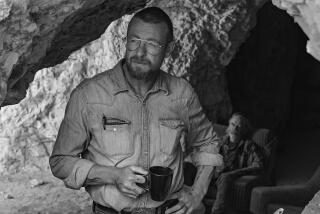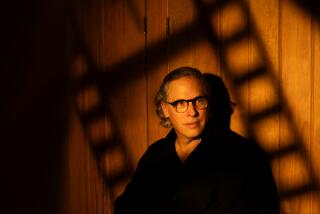Telluride Film Festival audiences take a shine to Barry Jenkins’ ‘Moonlight’
While writer-director Barry Jenkins was shooting his new movie, “Moonlight,” in Miami’s Liberty Square neighborhood, residents gathered around the filmmaker, who grew up in the area nicknamed “the Pork & Beans,” to enjoy a rare sight.
“ ‘Miami Vice’ does not shoot in the Pork & Beans,” Jenkins said. “In a neighborhood like that, people who want to do illicit things shoot out the streetlights. We had these bright movie lights. People were happy there was light, and they could let their kids come out and play.”
“Moonlight,” which played the Telluride Film Festival over Labor Day weekend to admiring reviews, and which opens theatrically Oct. 21, shines an intimate light on little-seen characters in film: an African-American male grappling with his sexuality at three moments in his life, and the complicated people who love him. Adapted from the Tarell Alvin McCraney play “In Moonlight Black Boys Look Blue,” the film is the first homegrown production for A24, the 4-year-old independent entertainment company that distributed last year’s best picture nominee “Room.”
In the hours before “Moonlight’s” first public screening at Telluride on Friday, in an interview together with his producers, Adele Romanski and Plan B Entertainment’s Dede Gardner and Jeremy Kleiner, Jenkins explained that while “Moonlight” tells a highly specific story, its intended audience is a broad one.
“There are people who don’t see themselves in arts and letters who want to see themselves, and yes, this is for them,” Jenkins said. “But I also want other people who do see themselves to see these people. This movie was made for anybody who has ever felt other, or like they can’t be themselves and be accepted in society.”
“Moonlight” follows a sensitive boy named Chiron, played at different ages by Alex Hibbert, Ashton Sanders and Trevante Rhodes, who is warily navigating his crime and machismo-fueled neighborhood. With his own, single mother (Naomie Harris) fighting a losing battle against drug addiction, Chiron finds a more stable makeshift family in Juan (Mahershala Ali), the neighborhood drug dealer, and Teresa (Janelle Monáe), and a sustaining relationship with a self-assured peer named Kevin, played at different ages by Jaden Piner, Jharrel Jerome and André Holland.
The movie is a blend of Jenkins’ and McCraney’s biographies. Both African American men who grew up in Liberty Square during the height of the crack epidemic, they didn’t meet until they connected as adults through Miami’s Borscht arts collective. Both had mothers who grappled with drug addiction: Jenkins’ mother survived, and has remained HIV positive for 24 years, while McCraney’s mother ultimately died from AIDS. Jenkins is straight and McCraney is gay.
“I’m an ally in making this movie and empathy can only get me so far,” Jenkins said of how his own biography and McCraney’s shaped the character of Chiron. “There are certain things that need to be in the source material.”
A Florida State film school grad, Jenkins began his relationship with Telluride as a student filmmaker in 2002, and over the years has curated the respected Colorado festival’s short-film program and served as an emcee at screenings. Telluride is known as a launching pad for films bound toward Oscar season, and a cinephile’s paradise, but the characters in “Moonlight” are apt to be new to the festival’s predominantly white and wealthy audiences.
“I always hoped this would play at Telluride,” Jenkins said. “I haven’t seen a film at Telluride where people talk the way they do in the world of this film.”
“Moonlight” is Jenkins’ second feature film. His first, 2008’s “Medicine for Melancholy,” a romance about a black heterosexual couple, attracted the attention of Gardner and Kleiner, who have produced films with Brad Pitt such as “The Big Short” and “12 Years a Slave.” When they brought “12 Years a Slave” to Telluride three years ago for its first public screening, it was Jenkins who moderated, an experience that ignited a creative dialogue between Plan B and the filmmaker.
“Barry mentioned that he was working on an adaptation of a James Baldwin novel [“If Beale Street Could Talk] and we said, ‘Aren’t those the hardest books to get the rights to?’ ” Kleiner said. “Barry said, ‘Well, I don’t actually have the rights.’ We said, ‘What else have you got?’ ”
By that point, Jenkins had been working on the “Moonlight” script, and having biweekly meetings with Romanski about its progress.
“The script was really redefining masculinity in terms of the conventional definition of what masculinity is,” Kleiner said. “It was there on the page. We had this reaction -- there is something so intimate here.”
Working with a less than $5-million budget, Jenkins and cinematographer James Laxton, who also shot Jenkins’ first film, sought to contrast the vibrant, open landscape of Miami with Chiron’s tendency to shrink within himself.
“It’s a heavy film in a certain way,” Jenkins said. “It has very serious issues. The characters are very muted. You could even say it’s kind of dark. But growing up there, I remember Miami as having bright lights, bright colors, big open sky.”
Gardner and Kleiner paired Jenkins with “Big Short” composer Nicholas Britell, who brought the “chopped and screwed” technique of slowing down and remixing hip-hop into the form of orchestral music.
The result is a fluid, bass-heavy score that tracks Chiron’s dawning understanding of manhood, and of himself.
In one scene in the film after young Chiron has been bullied, he asks Juan, the tough-but-kind drug dealer played by Ali, to explain what a gay slur means. Juan responds with a compassionate, matter-of-fact answer -- “It’s something people say to make gay people feel bad.”
“It felt like it’s possible that enlightened conversation can happen within a family,” Gardner said of the scene. “It might not be the family that you were born into, but that these moments of oasis are possible and you’ll hold onto them for the rest of your life.”
“Moonlight” goes to the Toronto Film Festival next, and if early reviews are any indication, a robust awards campaign is likely to follow. But there is one audience Jenkins will be especially anxious to screen for -- his family, which still lives in Miami.
“I’m working my mom up,” Jenkins said. “That’s gotta happen.”
See the most-read stories in Entertainment this hour »
Follow me on Twitter for more movie news: @thatrebecca
More to Read
Only good movies
Get the Indie Focus newsletter, Mark Olsen's weekly guide to the world of cinema.
You may occasionally receive promotional content from the Los Angeles Times.







